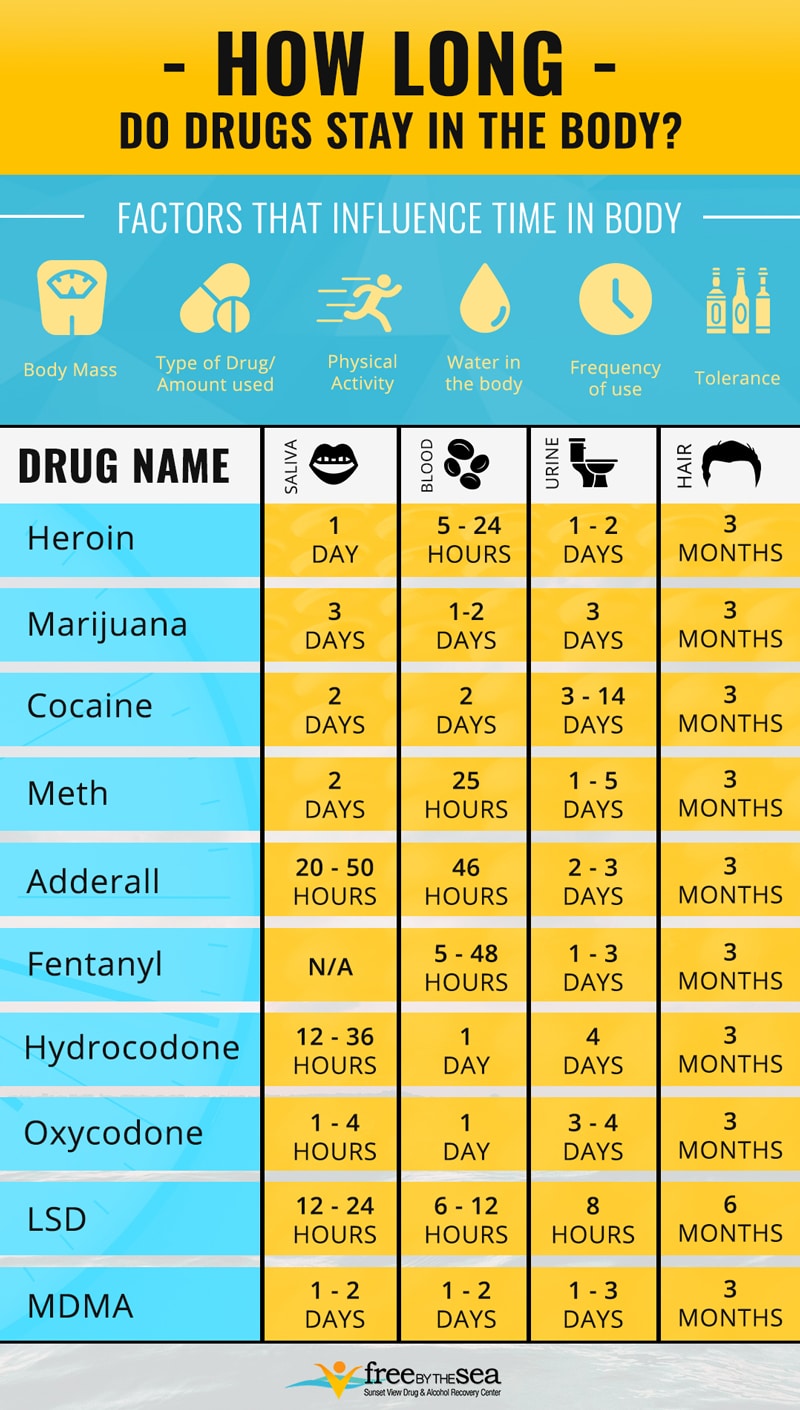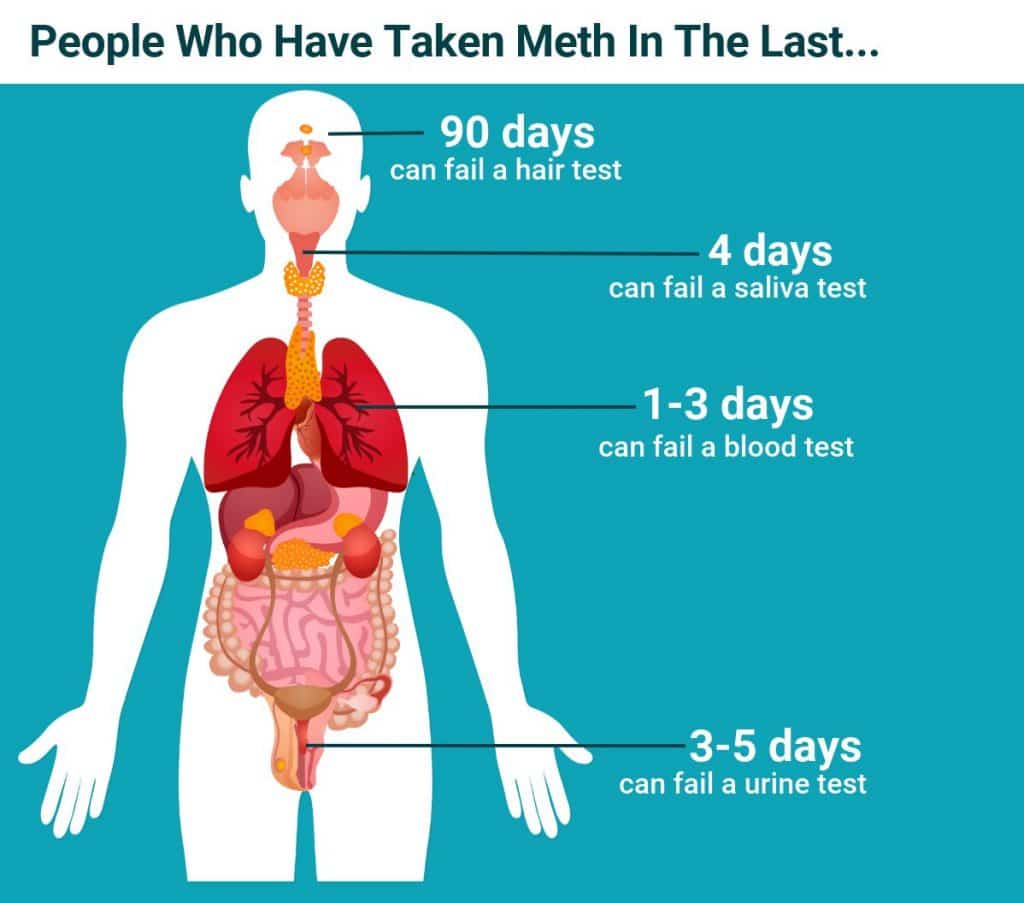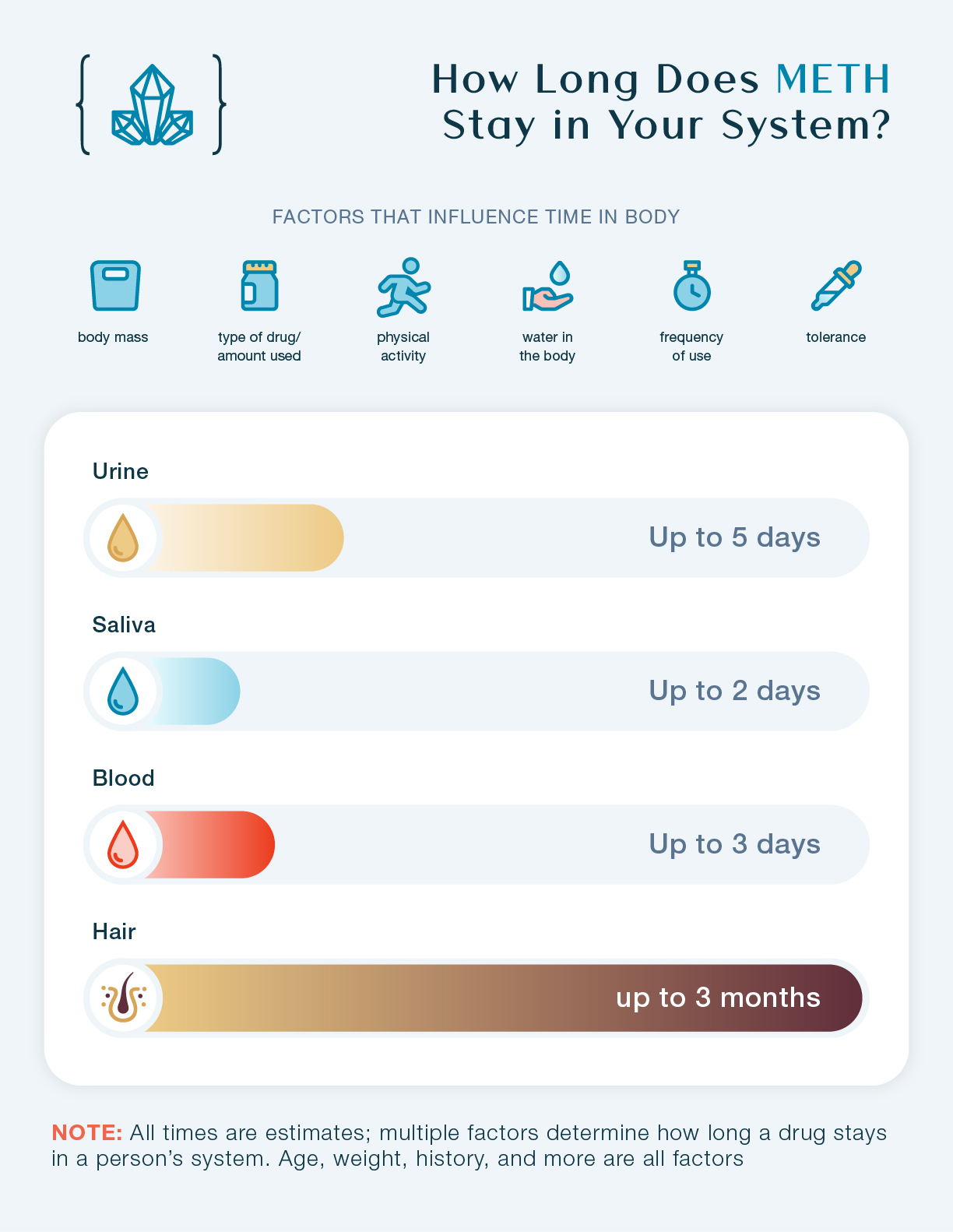How Long Does Meth Stay in Your System? Meth can stay in your system for up to 3-5 days. Methamphetamine is a highly addictive stimulant drug that can cause serious long-term damage to the brain and body.
Meth use can lead to addiction, cognitive impairment, and other health problems, making it crucial to understand how long it can stay in the body. The amount of time that meth stays in the body depends on a variety of factors, including the individual’s metabolism, the amount used, and the frequency of use.
Meth can be detected in urine, blood, saliva, and hair samples, and drug tests can be used to detect the presence of meth in the body. It is important to seek help if you or someone you know is struggling with meth addiction.

Credit: freebythesea.com
Introduction To Meth’s Impact On The Body
Methamphetamine can stay in your system for up to 3 days, but heavy use may prolong detection. The drug impacts the body by increasing heart rate, raising blood pressure, and causing significant weight loss. Regular use can lead to severe health issues and addiction.
Brief On Methamphetamine
Methamphetamine, commonly known as meth, is a highly addictive stimulant drug that affects the central nervous system. It is a crystalline powder that can be smoked, snorted, injected, or taken orally. Methamphetamine increases the release and blocks the reuptake of dopamine, a neurotransmitter associated with pleasure and reward, leading to an intense and prolonged euphoria.
Importance Of Understanding Its Persistence
Understanding how long meth stays in your system is crucial for various reasons. Firstly, it helps individuals who are using or have used methamphetamine to comprehend the potential risks and consequences associated with its use. Additionally, knowing the persistence of meth in the body is essential for healthcare professionals, drug testing agencies, and law enforcement officials to accurately detect and monitor its presence.

Credit: www.therecoveryvillage.com
Chemical Properties Of Methamphetamine
Methamphetamine’s chemical properties dictate its duration in the system. Meth can stay detectable for 2-4 days in urine. Factors like metabolism and usage frequency influence the drug’s presence in the body.
Methamphetamine, commonly known as meth, is a highly addictive stimulant that affects the central nervous system. It is a synthetic drug that is chemically similar to amphetamine but has more potent effects on the body. Meth is a crystalline powder that is odorless and bitter-tasting. In this section, we will discuss the chemical properties of methamphetamine, including its composition and how it interacts with the human body.
Meth’s Composition
Methamphetamine is made up of various chemicals that are mixed together to create a potent stimulant drug. Its primary ingredient is pseudoephedrine, which is found in cold and allergy medications. Other chemicals used in the production of meth include battery acid, drain cleaner, and antifreeze. Meth is synthesized in illegal laboratories, where the chemicals are mixed together and heated to create a crystalline powder.
How Meth Interacts With The Human Body
Once methamphetamine is ingested, it quickly enters the bloodstream and travels to the brain. Meth stimulates the release of dopamine, a neurotransmitter that is responsible for feelings of pleasure and reward. How Long Does Meth Stay in Your System? This flood of dopamine produces a euphoric high that can last for several hours. Meth also affects other neurotransmitters, including norepinephrine and serotonin, which are responsible for regulating mood, heart rate, and blood pressure. Methamphetamine has a half-life of around 12 hours, which means that it takes approximately 12 hours for half of the drug to be eliminated from the body.
However, meth can stay in the system for much longer, depending on factors such as the individual’s metabolism, the frequency of use, and the amount of meth consumed. In conclusion, methamphetamine is a dangerous and highly addictive drug that can have severe consequences on the body and mind. Understanding the chemical properties of meth is essential to understanding how it affects the body and how it can be detected in the system. It is crucial to seek help if you or someone you know is struggling with meth addiction.
Factors Affecting Meth Retention
Several factors affect meth retention in the body, including metabolism, frequency of use, and individual characteristics. The duration of meth staying in your system can vary widely based on these factors, ranging from a few days to several weeks.
Factors Affecting Meth Retention Individual Metabolism Variations The rate at which methamphetamine is metabolized and eliminated from the body can vary significantly from person to person. This is due to individual metabolism variations. Metabolism refers to the chemical processes that occur within the body to convert food and substances into energy. Some individuals have a faster metabolism, which means their bodies break down methamphetamine more quickly, leading to a shorter detection time in their system.
On the other hand, individuals with slower metabolisms may retain methamphetamine for a longer period. Frequency and Dosage of Use Another crucial factor that affects meth retention in the body is the frequency and dosage of use. The more frequently and heavily a person uses methamphetamine, the longer it will stay in their system. Methamphetamine is typically detectable in urine for up to 72 hours after use, but chronic users may have a longer detection window.
Additionally, higher doses of methamphetamine can take longer to be eliminated from the body compared to lower doses. The table below summarizes the factors affecting meth retention: | Factors | Meth Retention | |—————————|—————-| | Individual Metabolism | Varies | | Frequency of Use | Longer | | Dosage of Use | Longer | To optimize your chances of passing a drug test, it is important to consider these factors. Remember, everyone’s body is unique, and various elements can influence how long methamphetamine stays in your system. By understanding and being aware of these factors, you can make informed decisions and take appropriate measures to minimize the detection window.

Credit: www.theedgetreatment.com
Detection Windows For Meth
The Detection Windows for Meth refer to the period during which methamphetamine can be detected in various types of drug tests. The length of time meth stays in the body can vary depending on factors such as the individual’s metabolism, frequency of use, and the type of test being administered.
Urine Test Timelines
Urine tests are one of the most common methods for detecting methamphetamine use. Meth can typically be detected in urine within 2-5 days after last use, but heavy or chronic use may result in detection for up to a week.
Blood Test Timelines
Blood tests are less frequently used for detecting meth, as the drug rapidly metabolizes in the bloodstream. Methamphetamine can typically be detected in blood within 1-3 days after use.
Saliva Test Timelines
Saliva tests are becoming more popular for detecting recent drug use. Meth can typically be detected in saliva within 1-4 days after last use.
Hair Follicle Test Timelines
Hair follicle tests are able to detect a longer history of drug use. Methamphetamine can be detected in hair follicles for up to 90 days after last use, although results may vary.
Short-term Vs. Long-term Effects On Retention
Understanding the duration of methamphetamine, commonly known as meth, in your system is crucial for various reasons. Whether you are concerned about passing a drug test or curious about the impact of meth on your health, knowing how long it stays in your body can provide valuable insights. Meth can have both short-term and long-term effects on retention, which we will explore in detail.
Immediate Impact Of Meth Use
Methamphetamine is a powerful stimulant that affects the central nervous system. When ingested, it rapidly enters the bloodstream and reaches the brain, resulting in an immediate and intense high. The duration of this immediate impact can vary depending on factors such as the dose, purity of the drug, and individual metabolism.
The effects of meth use can last anywhere from a few hours to several days. During this time, individuals may experience increased energy, heightened focus, and euphoria. However, these short-term effects come at a cost. Meth can also lead to decreased appetite, insomnia, and increased heart rate and blood pressure.
Long-term Health Consequences
While the immediate impact of meth use may be appealing to some, the long-term health consequences are far more concerning. Regular meth use can have severe effects on both the body and the mind.
Physically, long-term meth use can lead to a range of health issues. These may include cardiovascular problems, such as heart disease and stroke, as well as respiratory issues and dental problems, often referred to as “meth mouth.” Additionally, chronic meth use can result in weakened immunity, weight loss, and skin problems.
The mental health consequences of long-term meth use are equally alarming. Methamphetamine can cause significant changes in brain chemistry, leading to cognitive impairments, memory loss, and increased risk of mental health disorders, such as depression and psychosis.
It is important to note that the duration of these long-term effects can vary depending on the individual and the extent of meth use. However, it is generally agreed upon that prolonged methamphetamine use can have devastating consequences on overall health and well-being.
Now that we have explored the short-term and long-term effects of meth use on retention, it is crucial to discuss how long meth stays in your system. Understanding the duration of methamphetamine in your body can help you make informed decisions about your health and seek appropriate treatment if necessary.
Meth Elimination Process
Meth elimination process refers to the body’s ability to break down and remove methamphetamine from the system. Understanding this process is important for those seeking to detox from meth and for healthcare professionals treating individuals struggling with methamphetamine abuse.
Body’s Natural Detoxification
The body naturally eliminates meth through a process called metabolism. This involves breaking down meth into smaller molecules for excretion. Metabolism primarily occurs in the liver, where enzymes facilitate the conversion of meth into inactive metabolites that can be eliminated from the body.
Role Of Liver And Kidneys
The liver plays a crucial role in meth metabolism, while the kidneys are responsible for filtering these metabolites out of the blood and into the urine for excretion. Both organs work in tandem to rid the body of meth and its byproducts. Liver enzymes such as cytochrome P450 are instrumental in the breakdown of meth, and the kidneys facilitate the excretion of metabolites through urine.
Influences Of Different Forms Of Meth
The influences of different forms of meth can significantly impact how long the drug stays in your system. Understanding these variations is crucial for individuals seeking accurate information about meth detection periods.
Smoked Vs. Injected Meth
Smoked Meth: Rapid absorption, stays in system for 1-3 days.
Injected Meth: Faster onset, detectable for up to 4 days.
Ingested Vs. Snorted Meth
Ingested Meth: Slower effects, detectable for 3-5 days.
Snorted Meth: Quick absorption, remains in system for 2-4 days.
Mitigating Risks And Ensuring Safety
Mitigating risks and ensuring safety are crucial when it comes to understanding how long meth stays in your system. Knowing the duration helps individuals make informed decisions about their health and well-being. Understanding the effects and potential risks can aid in taking necessary precautions for personal safety.
Strategies For Reducing Meth Harm
Implementing various harm reduction strategies can help minimize the risks associated with meth use.
- Education on safe consumption practices
- Seeking support from healthcare professionals
- Participating in counseling or therapy sessions
- Building a strong support network
Resources For Addiction Help And Support
Accessing the right resources is crucial for individuals struggling with meth addiction.
- Local rehab centers and support groups
- Hotlines for immediate assistance
- Online forums and communities
- Therapists specializing in addiction treatment
Frequently Asked Questions
How Long Does Meth Stay In Your System?
Meth can stay in your system for 2-3 days, but heavy users may test positive for up to a week. Factors like metabolism and hydration can affect detection times.
What Are The Effects Of Meth On The Body?
Meth can cause rapid heart rate, increased blood pressure, and decreased appetite. Long-term use can lead to severe dental problems, skin sores, and increased risk of infectious diseases.
Can Meth Be Detected In A Drug Test?
Yes, meth can be detected in urine, blood, or hair follicle tests. The detection window varies depending on the type of test, frequency of use, and individual metabolism.
How Does Meth Affect Mental Health?
Meth can lead to anxiety, confusion, insomnia, and violent behavior. Prolonged use may cause paranoia, hallucinations, and delusions, contributing to long-term psychological issues.
Conclusion
Understanding how long meth stays in your system is crucial for various reasons. By being informed about detection times, you can make better decisions regarding drug testing. Remember, individual factors play a significant role in how long meth remains detectable.
Stay aware and make informed choices.


